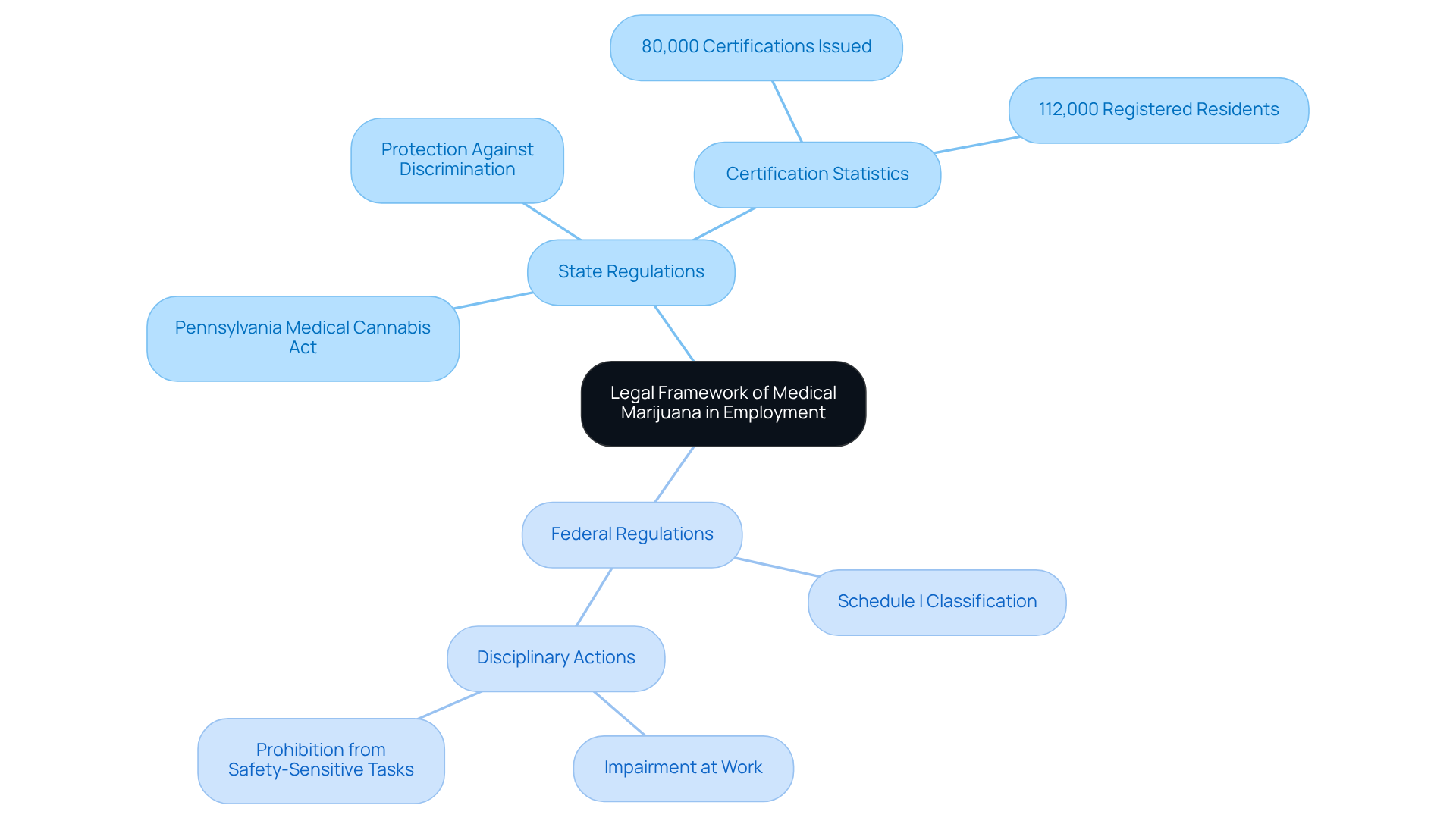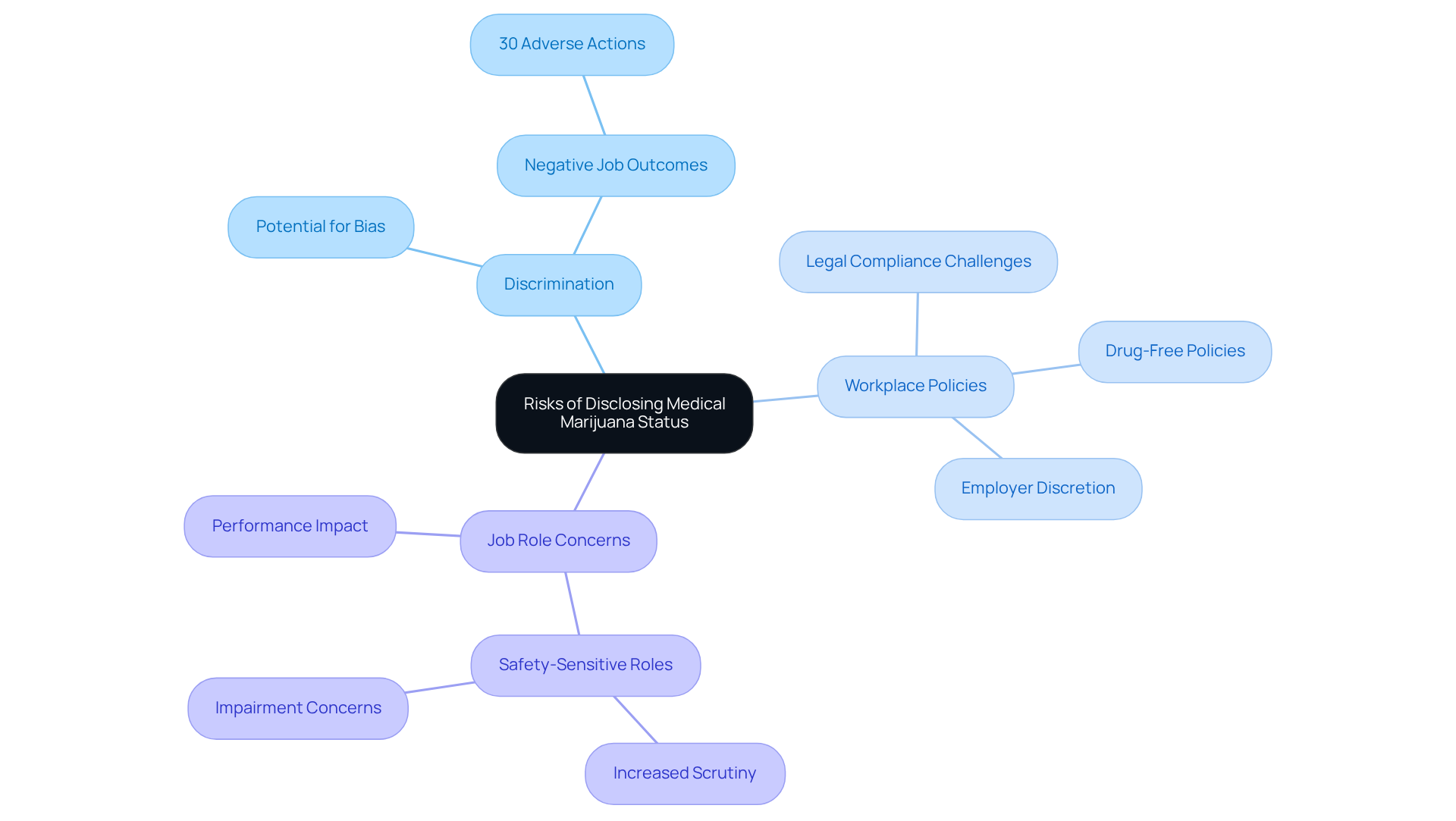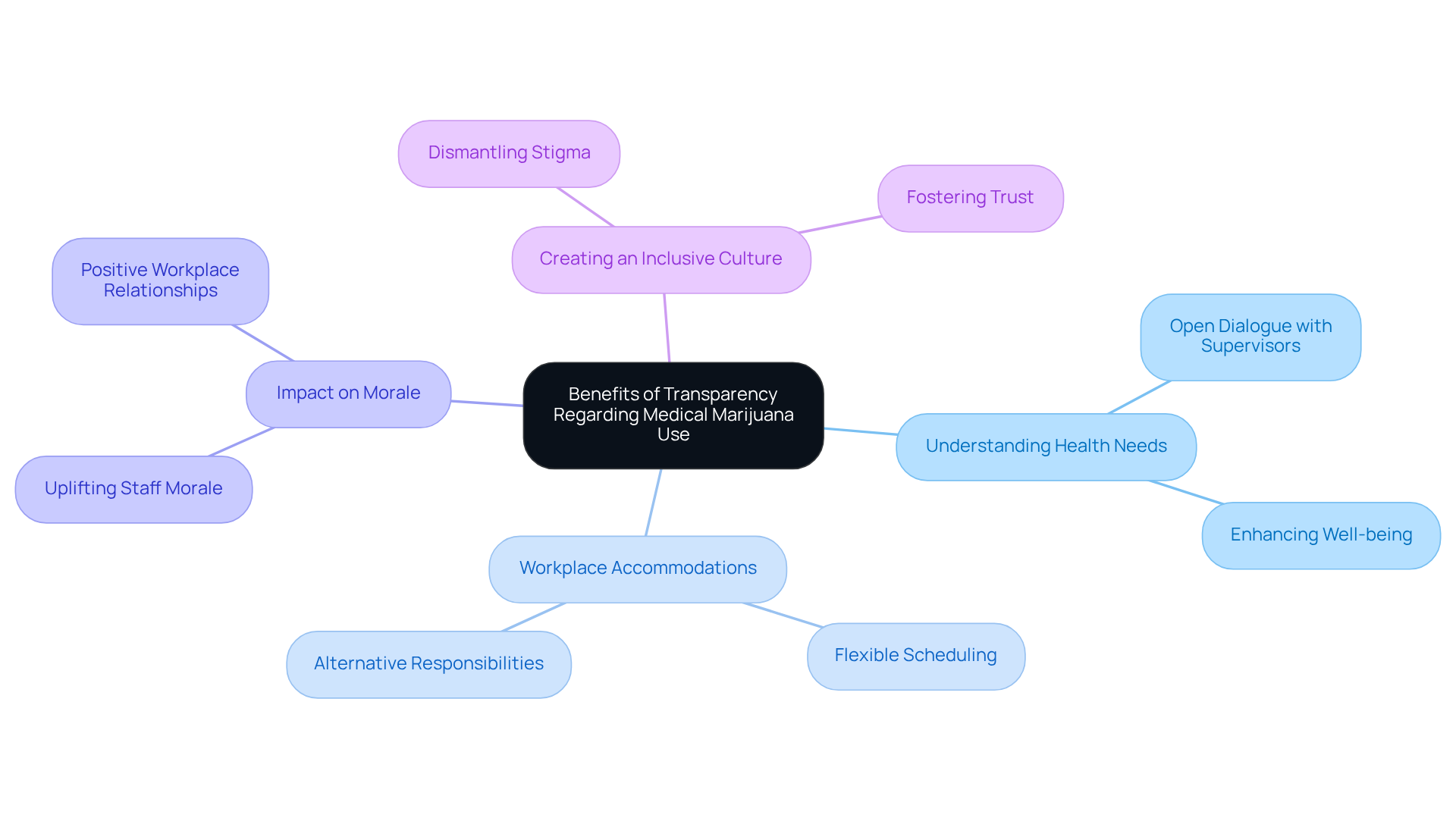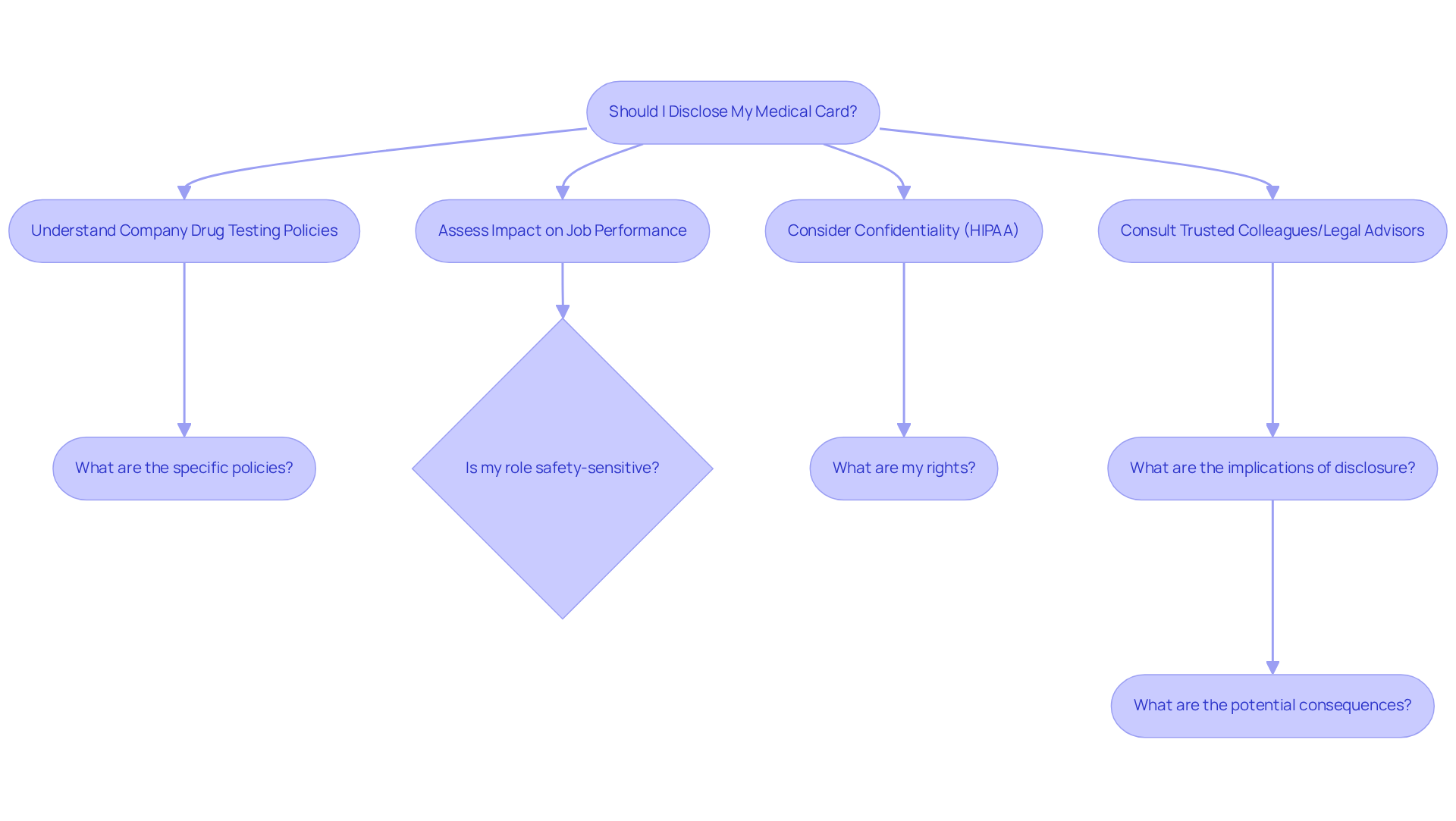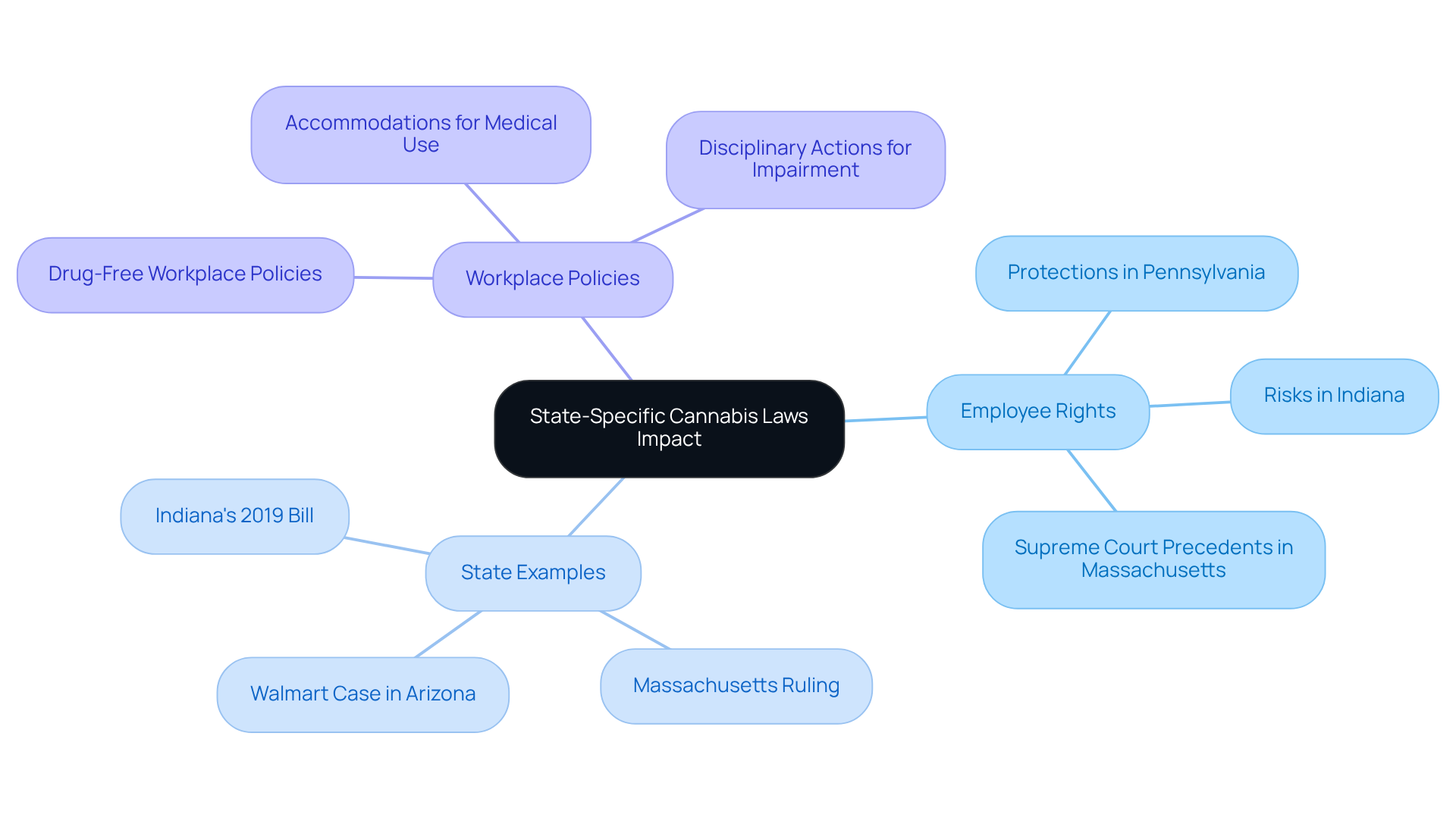Should I Tell My Employer I Have a Medical Card? Weighing Risks and Benefits
by Maya Green · July 29, 2025
Weigh the risks and benefits of “should I tell my employer I have a medical card” for informed decisions.

Overview
This article explores a sensitive issue: whether individuals should share their medical marijuana card status with their employer. It’s important to recognize the emotional weight of this decision. While some state laws offer protections against discrimination for cannabis use, the complexities of federal regulations can create uncertainty. Disclosing such information may lead to potential discrimination or job insecurity, especially in safety-sensitive roles.
As you navigate this decision, consider the possible risks and benefits. You may find that understanding your rights can empower you. It’s crucial to weigh the protections offered by your state against the potential consequences of disclosure. Remember, you are not alone in facing these challenges.
Ultimately, this decision is deeply personal. Reflect on your circumstances and what feels right for you. Know that seeking advice from trusted sources can provide clarity and support. Whatever path you choose, take a moment to acknowledge your feelings and the strength it takes to make such choices.
Introduction
Navigating the complexities of medical marijuana use in the workplace can be daunting for many employees. It’s essential to acknowledge the emotional weight of deciding whether to disclose their medical card status. As state laws evolve and protections against discrimination become more prevalent, individuals find themselves at a crossroads, weighing the benefits of transparency against the potential risks of bias or job loss.
You may find that the shifting legal landscape raises an important question: should you reveal your medical marijuana status to your employer? This decision carries significant implications for your job security and workplace dynamics. It’s important to remember that you are not alone in facing these challenges, and there are supportive resources available to help you navigate this journey with confidence.
Understand the Legal Framework of Medical Marijuana in Employment
Navigating the legal landscape surrounding cannabis in employment can feel overwhelming, and it varies greatly from state to state. Many states have put in place regulations designed to protect workers from discrimination based on their status as cannabis cardholders. For example, the Pennsylvania Medical Cannabis Act explicitly prohibits employers from denying employment or taking adverse actions against employees solely due to their use of medicinal cannabis, as long as they are not impaired at work. This legislation has led to over 80,000 certifications issued to residents of Pennsylvania, marking a significant shift in workplace policies regarding cannabis. Since the registry’s inception, more than 112,000 residents have enrolled in the medical cannabis program, showcasing its expanding influence.
However, the situation becomes more complicated when we consider federal law, which still categorizes cannabis as a Schedule I substance. This classification poses challenges for workers in federally regulated industries, where the risk of disciplinary actions remains high. Employers retain the right to discipline employees found under the influence of prescribed cannabis while on duty and can restrict them from performing safety-sensitive tasks if they are impaired. Furthermore, while the Act provides certain protections for authorized cannabis users, it does not require employers to allow its use on their premises.
Understanding these legal intricacies is crucial for anyone contemplating the question of should I tell my employer I have a medical card. This decision can significantly impact job security and workplace relationships, making it essential for workers to stay informed about both state protections and federal regulations. As Nancy Conrad wisely notes, “Employers must be aware of the Act and ready to appropriately manage workers at the worksite who are authorized to use medicinal cannabis.” It’s important to remember that being informed empowers you to make decisions that safeguard your rights and well-being.
Evaluate the Risks of Disclosing Your Medical Marijuana Status
It can feel daunting to consider whether I should tell my employer I have a medical card, and it’s essential to thoughtfully evaluate the various risks involved. One major concern is the potential for discrimination or bias from employers who may not fully understand cannabis use. In workplaces with strict drug-free policies, disclosing your status could lead to disciplinary actions or even termination, especially if a drug test indicates a positive result for cannabis. It’s important to remember that workplace discrimination against cannabis users remains a significant issue, with many individuals reporting negative job outcomes after sharing their use. For instance, in 2025, it was noted that approximately 30% of workers who disclosed their cannabis use experienced adverse employment actions, highlighting the associated risks.
Furthermore, if you’re in a safety-sensitive role, you may face even greater scrutiny, as employers often worry about how impairment could affect job performance. Employers find themselves navigating a complex legal landscape, balancing state laws that permit therapeutic cannabis use with federal regulations that classify cannabis as a Schedule I controlled substance. Even in regions where cannabis use is legal, organizations can still enforce drug-free policies, particularly for positions that prioritize safety.
Consequently, it’s crucial to assess your workplace culture and the specific policies of your organization before considering the question of whether I should tell my employer I have a medical card. The outcomes can vary significantly based on the organizational atmosphere. You may find that having an open conversation with HR or trusted colleagues can provide clarity and support as you navigate this decision.
Assess the Benefits of Transparency Regarding Medical Marijuana Use
Revealing your cannabis-related status raises the question of should I tell my employer I have a medical card, which can feel daunting but also opens the door to meaningful benefits. Engaging in transparent dialogue with your supervisors about whether you should tell your employer you have a medical card fosters a deeper understanding of your health needs, which may lead to adjustments that enhance both your well-being and productivity. For example, if your role involves operating heavy machinery, you may wonder, should I tell my employer I have a medical card, as discussing your cannabis use might encourage your employer to explore flexible scheduling or alternative responsibilities that minimize risk. This proactive conversation nurtures an atmosphere of trust and helps dismantle the stigma surrounding cannabis, which may lead to questions like should I tell my employer I have a medical card, ultimately contributing to a more inclusive workplace culture.
As of 2021, 39 states have taken significant steps by legalizing marijuana for medical use, raising the question of whether I should tell my employer I have a medical card, as there is a growing acknowledgment of the necessity for workplace accommodations for medical marijuana users. In considering whether I should tell my employer I have a medical card, it’s important to note that implementing these accommodations can greatly uplift staff morale and productivity, as evidenced by case studies highlighting the positive impact of transparency on workplace relationships. Joseph L. Fink, a professor emeritus of pharmacy law and policy, wisely notes that “both advantages and issues are present, but enacting policies and regulations enhances productivity and ensures safety.” By openly discussing cannabis use, you can help create a more understanding and accommodating work environment, which may lead you to wonder, should I tell my employer I have a medical card, aligning with the supportive services provided by platforms like Leafy DOC. It’s important to remember that your voice matters in shaping a compassionate workplace, especially when considering if you should tell your employer you have a medical card.
Navigate the Decision: Key Considerations for Disclosure
When contemplating if I should tell my employer I have a medical card, it’s essential to thoughtfully evaluate several important factors. Begin by reflecting on your organization’s drug testing policies and the current atmosphere regarding cannabis use. Understanding how your employer has handled similar situations in the past can provide valuable insights into what you might expect.
You may find it helpful to consider the nature of your position—think about whether your cannabis consumption could impact your job performance or safety. It’s important to remember that cannabis use cards do not show up on background checks due to HIPAA law, which helps protect your confidentiality.
Consulting with trusted colleagues or legal advisors can also offer additional perspectives on your rights and the implications of disclosure. Remember, staff members often wonder, should I tell my employer I have a medical card, as they are not obligated to disclose their cannabis cardholder status unless required by company policies or specific circumstances, such as drug tests.
Ultimately, your decision should align with your comfort level and the unique dynamics of your workplace. With nearly 30% of federal staff in testing-designated roles needing to undergo drug testing at least annually, being aware of these policies is crucial for making informed choices. Take your time to weigh your options, and know that you are not alone in navigating this complex situation.
Consider the Impact of State-Specific Laws
State-specific regulations significantly affect the rights of cannabis users in the workplace, raising the question of should I tell my employer I have a medical card, and it’s essential to recognize how these laws can impact your experience. In many areas, there are clear protections in place to safeguard workers from discrimination based on their cannabis status. For instance, Pennsylvania’s legislation prevents companies from taking negative actions against employees solely for their cannabis use, as long as they are not impaired while working. This legal framework allows individuals to utilize their health cards without fear of retaliation, fostering a more inclusive and supportive work environment.
However, it’s important to remember that even with these safeguards, state regulations do not require businesses to accommodate cannabis use in the workplace, leading to the question: should I tell my employer I have a medical card? In states lacking such protections, workers may question, should I tell my employer I have a medical card, as they may face significant risks if they disclose their cannabis status. Organizations in these regions may enforce strict drug-free policies, which could lead to disciplinary actions or even termination. Recent changes in state regulations highlight the need for employees to stay informed about their rights and the legal landscape surrounding cannabis use.
For example, Indiana’s 2019 law aimed to prevent job discrimination against cannabis patients while still allowing businesses to maintain a drug-free environment. This delicate balance underscores the evolving nature of workplace policies regarding cannabis and the importance of understanding local regulations. As one expert noted, “This provision was presumably created with the aim of reducing an employer’s liability for the actions of workers under the influence of cannabis.”
Additionally, the Massachusetts Supreme Judicial Court decision has set a precedent for accommodating prescribed substances, including therapeutic cannabis, further shaping workplace regulations and workers’ rights.
As the legal landscape continues to shift, it’s crucial for employees to research their state’s specific laws to decide if they should tell their employer they have a medical card. By advocating for your rights and understanding the protections available, you can navigate the complexities of medical marijuana use in the workplace more effectively. Remember, you are not alone in this journey, and seeking knowledge is a powerful step toward empowerment.
Conclusion
Navigating the decision to disclose a medical marijuana card to an employer can feel overwhelming. It’s essential to consider both the legal framework and your personal circumstances. The complexities of state and federal laws, along with the potential repercussions of such a disclosure, create a challenging landscape for employees like you. Understanding these nuances is crucial for making an informed choice that aligns with your rights and workplace dynamics.
Key points to reflect on include:
- The varying protections offered by state laws against discrimination for medical cannabis use.
- The risks of bias or job loss that could arise from disclosure.
- The potential benefits of fostering open communication with your employer.
- The importance of assessing your workplace culture, drug testing policies, and the specific nature of your job before making a decision.
- Engaging with HR or trusted colleagues to provide valuable insights that help clarify the implications of this choice.
Ultimately, this decision transcends legality; it also involves your personal comfort and the potential for creating a more inclusive work environment. As the legal landscape continues to evolve, staying informed about your rights is essential. You have the power to advocate for yourself. The journey toward transparency may feel daunting, but it can lead to stronger workplace relationships and a more supportive atmosphere for everyone navigating similar challenges. Remember, you are not alone in this process.
Frequently Asked Questions
What legal protections exist for medical marijuana users in the workplace?
Many states have regulations protecting workers from discrimination based on their status as cannabis cardholders. For example, the Pennsylvania Medical Cannabis Act prohibits employers from denying employment or taking adverse actions against employees solely due to their medicinal cannabis use, provided they are not impaired at work.
How does federal law affect medical marijuana use in employment?
Federal law still classifies cannabis as a Schedule I substance, which complicates the situation for workers in federally regulated industries. Employers can discipline employees found under the influence of prescribed cannabis while on duty and can restrict them from performing safety-sensitive tasks if impaired.
Can employers restrict the use of medical marijuana on their premises?
Yes, while the Act provides certain protections for authorized cannabis users, it does not require employers to allow its use on their premises.
What should employees consider before disclosing their medical marijuana status to employers?
Employees should evaluate the risks of potential discrimination or bias, especially in workplaces with strict drug-free policies. Disclosing their status could lead to disciplinary actions or termination, particularly if a drug test shows a positive result for cannabis.
What is the impact of workplace culture on the decision to disclose medical marijuana status?
The outcomes of disclosing cannabis use can vary significantly based on the workplace culture and specific organizational policies. Assessing the workplace environment and possibly discussing concerns with HR or trusted colleagues can provide clarity.
What percentage of workers experienced adverse employment actions after disclosing their cannabis use?
Approximately 30% of workers who disclosed their cannabis use reported experiencing negative job outcomes, highlighting the associated risks of disclosure.
What should employers do regarding employees who are authorized to use medicinal cannabis?
Employers should be aware of the applicable laws and manage workers at the worksite who are authorized to use medicinal cannabis appropriately, balancing state protections with federal regulations.
Last Updated: July 28, 2025
Get Approved for Your Medical Marijuana Card in Minutes!

Get Your Medical Card
Connect with a licensed physician online in minutes

Like This Article?
Share with your friends
Table of Contents
Keep Reading
-
Answering Your FAQs About Medical Marijuana Dispensaries In Ohio
Discover everything you need to know about medical marijuana dispensaries in Ohio. Access safe and legal cannabis products today! Find out more about Ohio Cannabis Dispensary FAQs now.
-
Investing In Cannabis Retail Staff Training For Success
Discover the key to success in the cannabis industry by investing in top-notch training for your retail staff. Learn how proper development can lead to greater success and growth. Click now to unlock the potential of your team!
-
The Battle for Marijuana Legalization in Oklahoma: Why Voters Ultimately Said ‘No’
Last week, 63 percent of Oklahoma voters said no to a proposal that would have allowed recreational marijuana use for people over 21. This means that the recreational use of marijuana is still not legal in Oklahoma, even though the state has already approved over 2,800 medical marijuana licenses and has more than 400 dispensaries…

